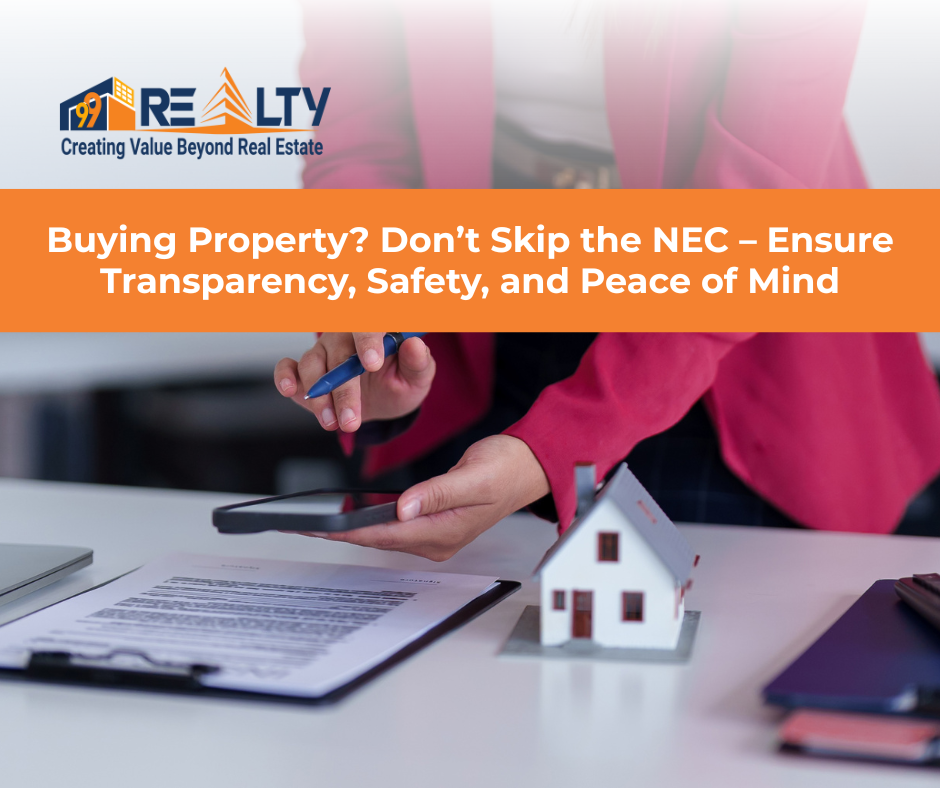If you’re planning to buy property in India, chances are you’ve come across the term Non-Encumbrance Certificate (NEC). At first glance, it sounds like complicated legal jargon. But in reality, it’s a pretty straightforward document that plays a massive role in ensuring your dream property doesn’t come with hidden troubles.
Put simply, a Non-Encumbrance Certificate is proof that a property is free from any legal or financial liabilities. Think of it as a clean chit that says, “This land or house has no disputes, mortgages, or pending dues attached to it.
Possession Certificate in India: The Ultimate Guide to Secure Home Ownership
The Legal Backbone of Property Ownership
Property ownership in India isn’t just about having the keys or holding a title deed. The real backbone is the NEC because it validates that your ownership isn’t clouded by someone else’s financial obligations or legal tussles. Without it, ownership is like driving a car without registration papers—you’re never entirely safe.
Why is an NEC Important in Real Estate Transactions?
Buying property is one of the biggest financial decisions most people make in their lifetime. And in a market like India, where disputes are unfortunately common, skipping the NEC is like walking blindfolded into a deal.
Establishing Ownership Legitimacy
NEC is the foundation of proving that the seller actually owns the property and has every right to sell it. Without this certificate, the buyer risks falling into ownership disputes later.
Safeguarding Against Fraud
Fraud in real estate isn’t a myth—it’s a reality. Sellers might conceal mortgages, pending loans, or court disputes. The NEC pulls back the curtain, ensuring buyers don’t get tricked into a bad deal.
Essential for Home Loans and Mortgages
Banks don’t just hand out home loans blindly. An NEC is a mandatory requirement because lenders want assurance that their investment is tied to a clean, dispute-free property.
Key Benefits of Obtaining a Non-Encumbrance Certificate
Now that we know why it’s important, let’s dig into the perks.
Transparency in Property Dealings
When both buyer and seller have an NEC in hand, there’s absolute clarity. No skeletons in the closet. It builds trust and removes second-guessing from the transaction.
Confidence for Buyers and Sellers
Imagine buying a property and always fearing that someone might knock on your door with a claim. With an NEC, both sides feel confident—buyers know they’re investing safely, and sellers know they’re showcasing transparency.
Legal Protection for Future Disputes
Should a dispute arise years down the line, the NEC acts like a shield. It’s a legal record proving that, at the time of purchase, the property was free from any encumbrances.
Simplifies Financial Transactions
From securing loans to registering properties, an NEC streamlines financial procedures. It acts like a green signal for banks and government bodies to move things faster.
Top Financial Mistakes to Avoid When Buying a Home
When Do You Need an NEC?
You don’t always need this certificate, but in some cases, it’s absolutely unavoidable.
Buying or Selling Property
Whether you’re a buyer or a seller, the NEC is non-negotiable. It’s the first stamp of credibility that makes any deal stronger.
Applying for Loans or Mortgages
Financial institutions won’t even consider loan applications unless an NEC is produced. It’s their way of ensuring the property can act as reliable collateral.
Property Mutation in Municipal Records
When you transfer ownership in municipal records after a purchase, the NEC is needed to verify that the property doesn’t carry hidden liabilities.
How to Apply for a Non-Encumbrance Certificate in India
The good news? Getting an NEC isn’t rocket science. Depending on your state, you can apply online or offline.
Offline Application Process
Traditionally, applicants had to visit the Sub-Registrar’s Office (SRO) where the property is registered. You’d fill out a form, attach required documents, pay a small fee, and wait for the verification process.
Online Application Process
Today, many states like Karnataka, Andhra Pradesh, and Tamil Nadu allow NEC applications through their respective government portals. This saves time, avoids long queues, and makes the process transparent.
Required Documents
- Proof of identity (Aadhar, PAN, Passport, etc.)
- Property details (title deed, property tax receipts, etc.)
- Address proof
- Application form with relevant fee
Step-by-Step Procedure
- Fill out the application form (online or offline).
- Attach identity proof, property details, and supporting documents.
- Pay the required fee (varies by state and property size).
- Submit the application to the Sub-Registrar’s Office or upload it online.
- Wait for verification. Once cleared, the NEC is issued.
Validity and Renewal of NEC
Duration of Validity
Typically, an NEC is issued for a specific period—say, 10 to 30 years. It covers the history of the property within that timeframe. However, for some transactions, a shorter period (like 12 months) may suffice.
Renewal Process
If your NEC validity period lapses, you can always renew it by reapplying. Remember, each property transaction demands a fresh certificate to reflect updated records.
Common Misconceptions About NEC
Like many legal documents, NECs are often misunderstood. Let’s bust some myths.
NEC vs. Encumbrance Certificate
Some people use these terms interchangeably, but they aren’t the same everywhere. In most states, NEC is a type of Encumbrance Certificate, specifically confirming zero encumbrances. Always read the document carefully to understand what it certifies.
NEC is Not a Title Deed
Owning an NEC doesn’t make you the property owner. It’s simply proof that the property is free from legal dues. The title deed, on the other hand, confirms ownership.
Challenges People Face in Getting an NEC
Delays in Processing
Depending on where you live, applications can take anywhere from a few days to several weeks. Bureaucracy often slows things down.
Missing Records and Inaccuracies
Sometimes, old records aren’t digitized or properly maintained. This can cause hiccups in verification and even rejection of applications.
Navigating Regional Variations
Each state has its own rules. What’s acceptable in Karnataka may not apply in Maharashtra. Applicants often find it confusing to navigate these variations.
Expert Tips for a Smooth NEC Application
Double-Check Documentation
One missing document can delay your application. Always cross-verify requirements with the Sub-Registrar’s Office before submission.
Consult Legal Experts if Needed
If the property is large or involves multiple stakeholders, consulting a property lawyer is a smart move. They can ensure no loose ends are left untied.
Final Thoughts
A Non-Encumbrance Certificate isn’t just another piece of paper—it’s the backbone of secure property transactions in India. Whether you’re buying, selling, or applying for a loan, this document provides the assurance that your investment is safe. Skipping it can cost you not just money but peace of mind. Always remember: in real estate, clarity and legality are worth more than the property itself.
FAQs
Q1. How long does it take to get a Non-Encumbrance Certificate?
It usually takes 7–15 working days, but in some regions, it may stretch longer depending on workload and record availability.
Q2. Can I apply for an NEC online everywhere in India?
Not yet. While states like Andhra Pradesh, Karnataka, and Tamil Nadu have online portals, others still rely on offline applications.
Q3. What is the fee for getting an NEC?
It varies by state and property size but usually ranges from ₹200 to ₹1,000.
Q4. Is NEC required for agricultural land as well?
Yes, whether it’s residential, commercial, or agricultural land, NEC is necessary to prove it’s free from encumbrances.
Q5. Can an NEC be challenged later?
Yes, if hidden liabilities are discovered that weren’t recorded at the time of issuance, disputes can arise. However, in most cases, the NEC offers strong legal backing.
Need Help?
Need help evaluating a property or planning your next move in the market?
Reach out to 99 REALTY – your trusted real estate partner for smarter choices.
Subscribe to get updates on our latest posts and market trends.






Join The Discussion